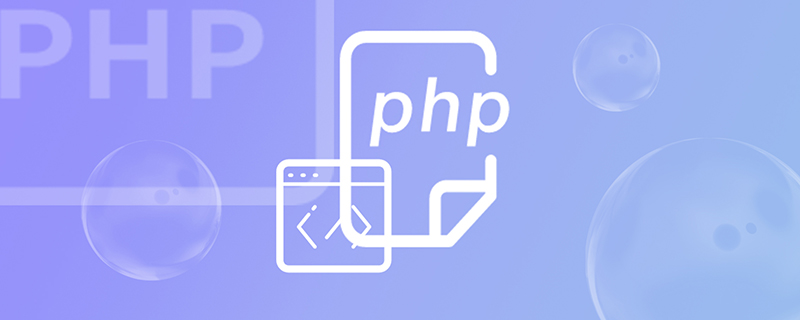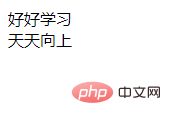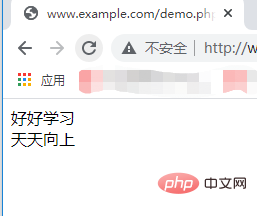 Backend Development
Backend Development
 PHP Tutorial
PHP Tutorial
 In five minutes, I will show you the interface declaration and application in PHP (detailed examples)
In five minutes, I will show you the interface declaration and application in PHP (detailed examples)
In five minutes, I will show you the interface declaration and application in PHP (detailed examples)
In the previous article, I brought you "How to set up, obtain and delete Session in PHP? ", which introduces in detail how to set up, obtain and delete Session in PHP. In this article, we will take a look at the relevant knowledge of the interface interface in PHP. I hope it will be helpful to everyone!

In our previous study, we learned about PHP inheritance, but PHP only supports single inheritance, which means that each class can only inherit one parent class. The characteristics of inheritance simplify the creation of objects and classes and increase the reusability of code. In order to solve the problem that PHP only supports single inheritance, PHP introduced interfaces. The interface can be understood as a special abstract class, and it can be regarded as a special class. Next, let's take a look at the relevant knowledge of the PHP interface.
Declaration of interface
Since the interface is a special class, it has its declaration method. It's called interface technology. We know from previous studies that normal class declarations are declared using the "class" keyword. Since the interface is special, the normal declaration method will not be used. Instead, the "interface" keyword is used. To implement the declaration of the interface.
Declare the interfaceinterface The syntax format of the keyword is as follows:
interface 接口名称{
// 常量成员
// 抽象方法
}What needs to be noted is:
All methods in the interface are abstract methods and do not need to be modified with the
abstractkeyword before the method. Because the default permission ispublicpublic, there is no need to modify it with public access permission in the interface.You can only use the
constkeyword in the interface to set member properties of constant types, and variables cannot be declared in the interface.Interfaces cannot be instantiated as objects. Interfaces can directly use the interface name to obtain the value of constant members outside the interface.
Let’s take a look at the example. The example is as follows:
<?php
interface Demo{
const STUDY = '好好学习';
const STUDY1 = '天天向上';
function fun1();
function fun2();
}
echo Demo::STUDY.'<br>';
echo Demo::STUDY1;
?>Output result:

Application of interface
implements keyword. If there are multiple interfaces to inherit, , must be used to separate each interface.
implements keyword, you can also use the extends keyword to inherit a class. It can be understood that you can implement multiple interfaces while inheriting a class. It should be noted that you must first use extends to inherit the class and then use implements to implement multiple interfaces. Its syntax format is as follows:
class 类名 extends 父类名 implements 接口一, 接口二, ..., 接口 n {
// 实现所有接口中的抽象方法
}<?php
interface Demo{
const STUDY = '好好学习';
const STUDY1 = '天天向上';
function fun1();
function fun2();
}
class Website implements Demo{
public function fun1(){
echo self::STUDY.'<br>';
}
public function fun2(){
echo self::STUDY1;
}
}
$obj = new Website();
$obj -> fun1();
$obj -> fun2();
?>
interface One{
function fun1();
function fun2();
}
interface Two extends One{
function fun3();
function fun4();
} interface Demo{
function fun1();
function fun2();
}
abstract class Website implements Demo{
public function fun2(){
... ... ;
}
abstract function fun3();
}PHP Video Tutorial" to learn more about PHP knowledge.
The above is the detailed content of In five minutes, I will show you the interface declaration and application in PHP (detailed examples). For more information, please follow other related articles on the PHP Chinese website!

Hot AI Tools

Undresser.AI Undress
AI-powered app for creating realistic nude photos

AI Clothes Remover
Online AI tool for removing clothes from photos.

Undress AI Tool
Undress images for free

Clothoff.io
AI clothes remover

Video Face Swap
Swap faces in any video effortlessly with our completely free AI face swap tool!

Hot Article

Hot Tools

Notepad++7.3.1
Easy-to-use and free code editor

SublimeText3 Chinese version
Chinese version, very easy to use

Zend Studio 13.0.1
Powerful PHP integrated development environment

Dreamweaver CS6
Visual web development tools

SublimeText3 Mac version
God-level code editing software (SublimeText3)

Hot Topics
 1386
1386
 52
52
 PHP 8.4 Installation and Upgrade guide for Ubuntu and Debian
Dec 24, 2024 pm 04:42 PM
PHP 8.4 Installation and Upgrade guide for Ubuntu and Debian
Dec 24, 2024 pm 04:42 PM
PHP 8.4 brings several new features, security improvements, and performance improvements with healthy amounts of feature deprecations and removals. This guide explains how to install PHP 8.4 or upgrade to PHP 8.4 on Ubuntu, Debian, or their derivati
 7 PHP Functions I Regret I Didn't Know Before
Nov 13, 2024 am 09:42 AM
7 PHP Functions I Regret I Didn't Know Before
Nov 13, 2024 am 09:42 AM
If you are an experienced PHP developer, you might have the feeling that you’ve been there and done that already.You have developed a significant number of applications, debugged millions of lines of code, and tweaked a bunch of scripts to achieve op
 How To Set Up Visual Studio Code (VS Code) for PHP Development
Dec 20, 2024 am 11:31 AM
How To Set Up Visual Studio Code (VS Code) for PHP Development
Dec 20, 2024 am 11:31 AM
Visual Studio Code, also known as VS Code, is a free source code editor — or integrated development environment (IDE) — available for all major operating systems. With a large collection of extensions for many programming languages, VS Code can be c
 Explain JSON Web Tokens (JWT) and their use case in PHP APIs.
Apr 05, 2025 am 12:04 AM
Explain JSON Web Tokens (JWT) and their use case in PHP APIs.
Apr 05, 2025 am 12:04 AM
JWT is an open standard based on JSON, used to securely transmit information between parties, mainly for identity authentication and information exchange. 1. JWT consists of three parts: Header, Payload and Signature. 2. The working principle of JWT includes three steps: generating JWT, verifying JWT and parsing Payload. 3. When using JWT for authentication in PHP, JWT can be generated and verified, and user role and permission information can be included in advanced usage. 4. Common errors include signature verification failure, token expiration, and payload oversized. Debugging skills include using debugging tools and logging. 5. Performance optimization and best practices include using appropriate signature algorithms, setting validity periods reasonably,
 How do you parse and process HTML/XML in PHP?
Feb 07, 2025 am 11:57 AM
How do you parse and process HTML/XML in PHP?
Feb 07, 2025 am 11:57 AM
This tutorial demonstrates how to efficiently process XML documents using PHP. XML (eXtensible Markup Language) is a versatile text-based markup language designed for both human readability and machine parsing. It's commonly used for data storage an
 PHP Program to Count Vowels in a String
Feb 07, 2025 pm 12:12 PM
PHP Program to Count Vowels in a String
Feb 07, 2025 pm 12:12 PM
A string is a sequence of characters, including letters, numbers, and symbols. This tutorial will learn how to calculate the number of vowels in a given string in PHP using different methods. The vowels in English are a, e, i, o, u, and they can be uppercase or lowercase. What is a vowel? Vowels are alphabetic characters that represent a specific pronunciation. There are five vowels in English, including uppercase and lowercase: a, e, i, o, u Example 1 Input: String = "Tutorialspoint" Output: 6 explain The vowels in the string "Tutorialspoint" are u, o, i, a, o, i. There are 6 yuan in total
 Explain late static binding in PHP (static::).
Apr 03, 2025 am 12:04 AM
Explain late static binding in PHP (static::).
Apr 03, 2025 am 12:04 AM
Static binding (static::) implements late static binding (LSB) in PHP, allowing calling classes to be referenced in static contexts rather than defining classes. 1) The parsing process is performed at runtime, 2) Look up the call class in the inheritance relationship, 3) It may bring performance overhead.
 What are PHP magic methods (__construct, __destruct, __call, __get, __set, etc.) and provide use cases?
Apr 03, 2025 am 12:03 AM
What are PHP magic methods (__construct, __destruct, __call, __get, __set, etc.) and provide use cases?
Apr 03, 2025 am 12:03 AM
What are the magic methods of PHP? PHP's magic methods include: 1.\_\_construct, used to initialize objects; 2.\_\_destruct, used to clean up resources; 3.\_\_call, handle non-existent method calls; 4.\_\_get, implement dynamic attribute access; 5.\_\_set, implement dynamic attribute settings. These methods are automatically called in certain situations, improving code flexibility and efficiency.



